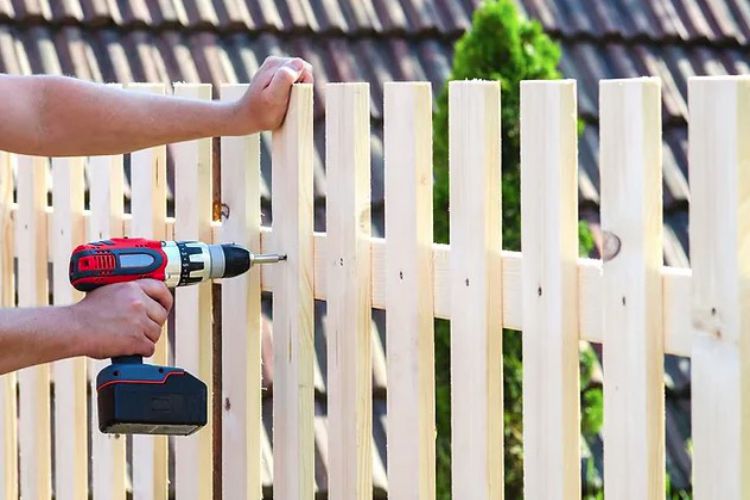 When creating a fence around your property, there are many considerations to remember. The decision-making process can be overwhelming, from material selection to budgeting and design. Here we’ll discuss the most important things to consider when building a fence for your property.
When creating a fence around your property, there are many considerations to remember. The decision-making process can be overwhelming, from material selection to budgeting and design. Here we’ll discuss the most important things to consider when building a fence for your property.
Material selection
The first consideration is what material you should use for your fence. Many materials are available today, from wood or metal posts and panels to vinyl or composite fences that provide a more modern look and feel. You may choose one material over another depending on your needs, budget, and aesthetic preferences. Generally, wooden fences are cheaper than metal or composites but require more maintenance. Metal fences are usually more durable but may require more labor to install. Vinyl or composite fences offer an outstanding balance between performance and aesthetics and can be installed in much shorter time frames than other materials.
Budgeting
The second thing to consider is budgeting for the project. Depending on the size of your property and the fence you choose, costs can range from $500-$5000 or even higher. The cost will depend on the material used and installation requirements. It’s essential to research and get quotes from different contractors before committing to any contractor or material supplier. Comparing prices will help you make an informed decision about which option is right for you.
Design
Another critical consideration when building a fence is the design. Do you want a traditional picket-style fence or something more modern and contemporary? Before settling on a particular style, consider your property’s overall footprint and how the fence will look with other structures like your home or outbuildings. Consider whether it should be painted or stained, which side should face outwards, and what decorative elements you want to include for an enhanced look.
Maintenance
While it may not be top of mind when deciding on a fence, you should also consider the future maintenance requirements associated with the type of fence you choose. Wooden fences require regular maintenance, such as staining and painting, to keep them looking their best. In contrast, metal or vinyl fencing can often just be left to stand up to the elements without any additional care required for many years.
Hiring a professional
Consider hiring a professional fence installer. While it is possible to install your fence, a trained and experienced contractor can provide expert advice and guidance on the right products and materials for the job and installation techniques that guarantee success. With their help, you can ensure your new fence is installed correctly without any problems or delays that could occur with DIY installation. Check https://www.superiorfencellc.com for an idea of what hiring a professional will cost you.
Benefits of installing a fence without help
While hiring a professional to install a fence can provide peace of mind, it is not always necessary or advisable. Depending on your project’s size and scope, you may save time and money by installing the fence yourself. It is especially true if you have some basic knowledge of construction and are comfortable using tools such as a saw, drill, level, and hammer.
DIY fencing will save you money on labor costs
If you install your fence without help, you can avoid the cost of hiring a professional to install it. It is a great way to save money, especially if you are on a budget. When building a fence, it’s crucial to consider factors such as material, height, and local regulations to ensure durability and compliance. Wood fences offer a balance of privacy and aesthetic appeal. To explore more about selecting the right wood fence for your needs, you can find out here now. This resource provides valuable insights to help you make an informed decision.
You will have more control over the design and installation
Installing your fence gives you complete control over every aspect of the project – from choosing the materials to ensuring that everything is installed correctly according to your specifications.
You can get creative with your design
DIY fencing also allows for more flexibility with the overall design of your fence. It’s an opportunity to express your creativity without worrying about whether or not a contractor has experience with certain materials or techniques.
Disadvantages of a DIY fence
Though there are several benefits, there are also some potential drawbacks to installing a fence yourself. Consider these before deciding if you’re up for the challenge.
It takes time and requires knowledge
If you don’t have the necessary skills and experience, installing your fence can be challenging and may take longer than expected. Even if you have the knowledge and resources, it is still essential to set aside plenty of time for the project, as mistakes can quickly occur when working with heavy materials or complex tools.
Mistakes can be costly
A mistake in installation can cause long delays and cost more money in repairs or replacement parts. If something goes wrong, you could end up paying much more than you would have if you had hired a professional in the first place.
It may not be as sturdy as a professionally installed fence
Suppose you do go ahead with a DIY fence installation. In that case, it is essential to remember that it won’t necessarily be as strong or durable as one built by an experienced contractor. It could mean more frequent repairs and maintenance in the future if you don’t get things right the first time.




